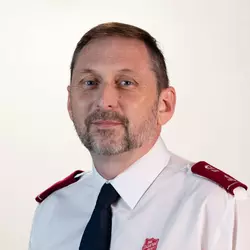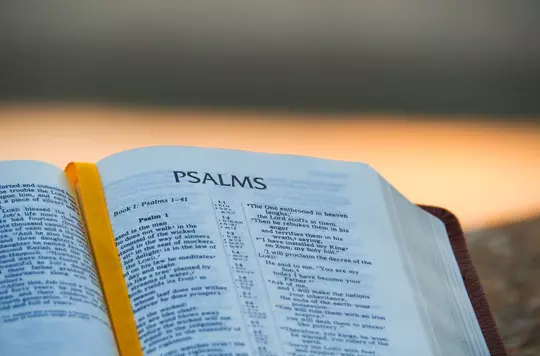7 November 2022
My eyes are fixed on you
Bible study by Major Nick Coke
Major Nick Coke reminds us that the psalms have a unique way of speaking directly to the heart as well as the head.
Key text
Hanging on my office wall is a print of a painting by Russian artist Ivan Kramskoi called Christ in the Wilderness (pictured below). Painted in 1872, it is an evocative and arresting image that captures a moment in the Gospel accounts of Jesus’ temptation by the Devil in the desert (see Matthew 4:1–11; Luke 4:1–13).
The Christ of the artist’s imagination is an earthly one. Jesus is depicted as poor and dishevelled, ravaged by 40 days in the desert without food and water. His hands are tightly clasped; his feet are filthy and bare. He sits in a bleak, unforgiving landscape of dry, jagged rocks. The image, however, emphasises more than just the physical challenge of surviving in the desert without comfort or nourishment. It also focuses in on Jesus’ internal struggle of heart and mind.
As Jesus contemplates the road that lies ahead of him, he stares at a delicately balanced rock that could at any moment fall to the left or the right. Jesus has choices to make about how he will live out his mission and calling. Looking at the painting, I find myself wondering what is going through his mind at that moment.
Pause and reflect
- Examine the painting for yourself. How does it capture and represent the physical and spiritual challenges of a life of faith?
On an initial reading of Psalm 141, it is noticeable how the writer, who is identified as King David, does something similar to Ivan Kramskoi’s Christ in the Wilderness. David’s prayer-poem is addressed to the Lord up in the heavens but it is completely grounded in the physical world.
Pause and reflect
Take a close look at the psalm and consider:
- How many parts of the body are mentioned across the 10 verses?
- How does the psalmist evoke all five senses (touch, sound, smell, sight and taste)?
This unity of the physical and spiritual is typical of a Hebrew way of thinking. Unlike ancient Greek ideas that emphasise a separation between body and soul, the writers of the Bible consistently avoid such a dichotomy. We can trace this integration of thought through Scripture from Genesis to Revelation.
The influence of ancient Greek philosophy on the Western church, however, has at times given the impression that the physical and spiritual aspects of life are somehow in competition. This has led, on occasion, to the elevation of one element above the other. This has had consequences on how Christians have thought about faith and the mission throughout the centuries.
Pause and reflect
- What are the dangers of separating the physical and spiritual aspects of faith?
- Can you think of ways an over- emphasis on either physical or spiritual salvation has influenced the way you think about the Christian life?
- What has helped you integrate your faith in body, mind and spirit?
One important thing we remember when studying the psalms is to note that they are poetry. Unlike law, history, biography, letters and other biblical genres, the poetry of the psalms has a unique way of speaking directly to the heart as well as the head. This is a particular gift of the poetic form and explains why the psalms have been central to Christian worship and devotion for millennia.
Psalm 141 is no exception. We are drawn into the inner prayer life of David and taken on a journey through his struggles with temptation. He declares his desperate need for God to keep him from harm, both in a physical and a spiritual sense. Afraid of his own weaknesses he calls on God to protect him. The metaphors and images of the poetry allow our imaginations to get to work in making connections with our own life experiences and struggles.
Pause and reflect
- How much can you relate to David’s prayer?
- Which image in this psalm most resonates with you? Why?
As we approach the end of the psalm, there is an image (echoes of which we find in Hebrews 12:2) that may provide us with the key to the questions we have been contemplating. David declares: ‘But my eyes are fixed on you, Sovereign Lord’ (v8). This is a moment of real conviction, as David comes to terms with the truth that it is in God, and God alone, that all the contradictions and tensions of life can be reconciled. Heaven and Earth, body and soul, all things spiritual and all things physical are reconciled in God.
May we also keep our eyes fixed on the Sovereign Lord. This is how we can learn to live God’s way.
Bible study by

Major Nick Coke
Territorial Co-ordinator for Justice and Reconciliation
Discover more

Search me, God, and know my heart
Lieut-Colonel Eirwen Pallant examines the vital signs of a healthy relationship with the Creator.

Resources to help you spread joy and peace this Christmas
An overview of the Advent and Christmas resources available on salvationist.org.uk to support local ministry.

Tightening budgets: ‘We all need to look out for each other’
Debt adviser Debbie White shares her experience of helping people with their finances and offers four budgeting tips we could all consider.

'I am not a tick box'
Joyce Chimkupete shares her journey towards accepting a leadership position at her corps.
